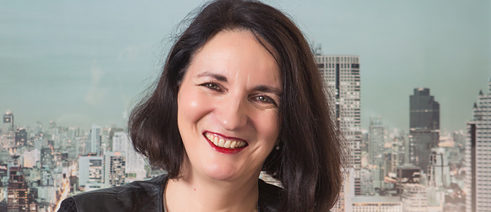Winter Paralympics 2018
When division unites

This year's Winter Paralympics are being held in Pyeongchang, South Korea. Marla Stukenberg is the director of the Goethe-Institut in Korea and talks about cooperation projects of the institute, especially about the cooperation with the Paralympics Zeitung.
Ms Stukenberg, the Goethe-Institut Korea was founded in 1968, and ever since has been committed to mediating between the Korean and German cultures. Is there something particularly similar about Germany and Korea?
Of course, division and reunification is an important shared issue. Despite all our differences, there is a great deal of interest in Korea in Germany’s experiences during and after reunification. In addition to many other aspects, both countries also have a shared enthusiasm for music.
Projects in a divided land
You announced that project work in North Korea since 2004 has been a crucial step towards the Goethe-Institut working in both parts of Korea. At the moment the situation is still very tense. What successes have there been?For a few years, a reading room in Pyongyang allowed people to have access to books and magazines from Germany. The Munich Chamber Orchestra was in North Korea for concerts and workshops. Paper restoration workshops were also held with German experts to preserve historically valuable manuscripts from the common history of the divided country. A selection of German films were subtitled in Korean and shown at festivals. Going forward, we hope that the current political situation will ease so that we can actively re-establish our cultural bridges to North Korea.
This year, the Goethe-Institut Korea is a project partner of the Paralympics Zeitung and is ensuring that there will also be a Korean edition in cooperation with the Korean newspaper Hankyoreh. What are your goals and wishes for this partnership?
Disabled sports and issues such as inclusion, participation and independent and self-determined lives for people with disabilities play a socially subordinate role in South Korea. There was not much interest in the 2018 Paralympics held in their own country. Against this background, the Goethe-Institut Korea considered the publication of a Korean edition of the Paralympics Zeitung an opportunity to give disabled sports in Korea more publicity while at the same time promoting journalistic exchange between Germany and Korea. We are very pleased that the Korean edition will be released on 16 March.
Inclusion through sport
A lot is done in Germany to promote inclusion as well as disabled and rehabilitation sports. Inclusion is a social mission that can be conveyed through sport and culture. Is the same true in Korea?In Germany, inclusion is also still a work in progress and it’s no different in Korea. The Goethe-Institut will certainly continue to be involved in this field. In 2017, for example, we supported the participation of Berlin’s Thikwa Theater in the Korea International Accessible Dance Festival, which was launched in 2016 by the South Korean Ministry of Culture, Sports and Tourism in cooperation with embassies and cultural organisations from various countries. The Korean Paralympics motivate us to continue working in this field.
Can the Paralympic Games sustainably improve the situation and increase support by the public and the business world for people with disabilities in South Korea?
We hope that the Paralympics will positively impact society’s image of people with disabilities and their potentials in Korea and worldwide. It remains to be seen whether they will lead to lasting improvements. But the current mood in society, especially under the new government, is certainly a good sign.
The interview was conducted by Jisu Yon, 20, junior reporter at the Paralympics newspaper.
An un-edited version of the interview was published in the Tagesspiegel on 2nd March 2018.